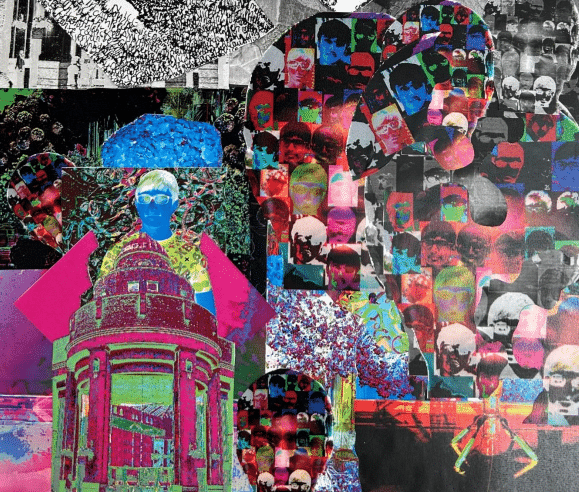
QE’s pupil-run arts magazine, The Arabella, looks both to the past and the future in a special edition for the School’s 450th anniversary year.
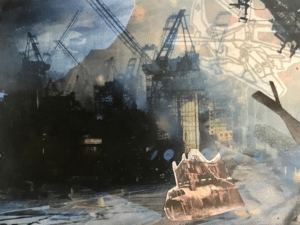 The 44-page publication features 26 pieces of poetry, prose, and art, many of them inspired by its anniversary-related theme, How did we get here? The approach, looking both backward and forward, mirrors that of the School’s anniversary celebrations on Founder’s Day which included a display of the School’s 1573 Royal Charter alongside the burying of a time capsule intended for the pupils of 2073, when QE will mark its 500th anniversary. Work on the magazine began last academic year, but it has only now been published.
The 44-page publication features 26 pieces of poetry, prose, and art, many of them inspired by its anniversary-related theme, How did we get here? The approach, looking both backward and forward, mirrors that of the School’s anniversary celebrations on Founder’s Day which included a display of the School’s 1573 Royal Charter alongside the burying of a time capsule intended for the pupils of 2073, when QE will mark its 500th anniversary. Work on the magazine began last academic year, but it has only now been published.
Assistant Head (Pupil Involvement) Crispin Bonham-Carter said: “The ninth edition of The Arabella has been worth the wait: with its expanded contents and an eclectic mix of topics and styles, it is a great demonstration of the fruits of free-thinking scholarship and academic curiosity.”
The magazine includes contributions from boys throughout the School, although boys from the current Years 8 and 9 feature especially heavily.
In his introduction, one of the editors, Chanakya Seetharam, of Year 12, addresses his fellow QE pupils: “Just as the [450th anniversary thanksgiving] service at Westminster Abbey in the Spring Term so well captured, this is as much cause to look back with an inquisitive eye into the past as to look forward to the future. It is this spirit of investigation that is the kernel of this edition, and which was so well taken up by you….
“You are what keeps The Arabella alive. This is a magazine by you and for you. We hope you will find all of the work here thoroughly insightful, interesting, and enjoyable, and here’s to a great next edition!”
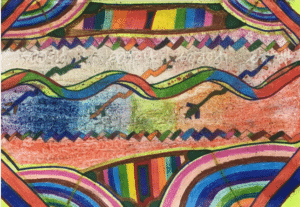 The poetry section is highly varied, with contributions ranging from Year 9 boy Yingqiao Zhao’s piece about the moon – which is in the shape of a crescent and has key words picked out in different colours – to the nine-stanza rhyming French poem, La Mort de L’Ancien, composed by Year 13’s Aayush Backory. The poetry section closes with Nikhil Francine, of Year 9, addressing the anniversary directly with a poem entitled Thriving from Ancient Roots – the School’s slogan for the anniversary year.
The poetry section is highly varied, with contributions ranging from Year 9 boy Yingqiao Zhao’s piece about the moon – which is in the shape of a crescent and has key words picked out in different colours – to the nine-stanza rhyming French poem, La Mort de L’Ancien, composed by Year 13’s Aayush Backory. The poetry section closes with Nikhil Francine, of Year 9, addressing the anniversary directly with a poem entitled Thriving from Ancient Roots – the School’s slogan for the anniversary year.
The creative writing pages included Year 9 pupil Raaghav Dhanasekaran predicting a dystopian future amid huge hurricanes caused by climate change.
The music writing section on the other hand looks mostly to the past, from Nikhil Francine’s essay on A brief history of song to Moneshan Rathaparan and Eshwara Masina, both of Year 8, jointly exploring The Enduring Influence of Classical and Baroque Music on Contemporary Culture.
Year 12 student Akheel Kale, from the editorial team, praises the quality of Year 13 pupil Ashish Yeruva’s essay on Justice for Ukraine: How to Put Russian Leaders on Trial Using International Law. Ashish’s contribution had inspired the team to open a current affairs section in the magazine and to invite further such submissions in the future, Akheel says.
Similarly, the magazine has a new section on Science, featuring Year 10 boy Zain Syed’s submission of an extensive flow chart setting out A Natural History of the Earth.
 Interspersed throughout The Arabella are artworks exploring themes including Expressive Heads, Distortion and Identity; Dystopian Landscape; and Art Inspired by Music. Shown in this news story, from top to bottom, are:
Interspersed throughout The Arabella are artworks exploring themes including Expressive Heads, Distortion and Identity; Dystopian Landscape; and Art Inspired by Music. Shown in this news story, from top to bottom, are:
- Expressive Heads, Distortion and Identity, by Sushan Naresh, Year 10 (main image)
- Dystopian Landscape, by Krishav Sundar Rajan, Year 9
- Art Inspired by Music, by Galinghan Balamurugan, Year 8
- Expressive Heads, Distortion and Identity, by Ayush Saha, Year 10
The magazine is named after Arabella Stuart, a descendant of Henry VII and sixth in line to the throne, who fell foul of King James I when in 1610 she secretly married another potential heir to the throne, William Seymore. Her husband was sent to the Tower of London, while Arabella was committed to the care of the Bishop of Durham, but fell ill in Barnet en route. She stayed for some months at the home of QE Governor Thomas Conyers, her spiritual needs attended to by another Governor, Rev Matthias Milward, who was subsequently appointed Master (Headmaster) of the School.
- For anyone with access to the School’s eQE portal, The Arabella is available to read here.

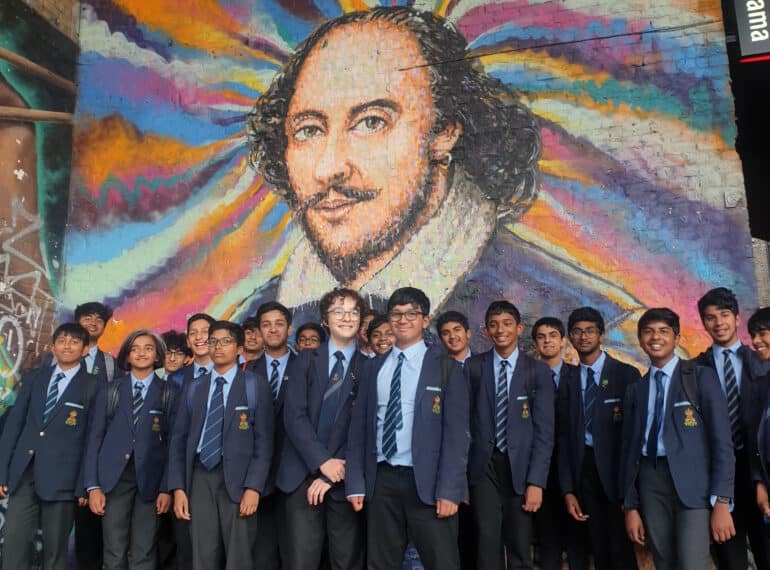
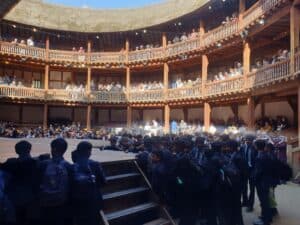 The visit by the whole year group over three days was only the latest in a series of QE trips to the Globe: in the last three months, more than 400 boys and staff have travelled down the Northern Line to see Shakespeare plays at the modern reconstruction close to the site of the 17th-century theatre.
The visit by the whole year group over three days was only the latest in a series of QE trips to the Globe: in the last three months, more than 400 boys and staff have travelled down the Northern Line to see Shakespeare plays at the modern reconstruction close to the site of the 17th-century theatre.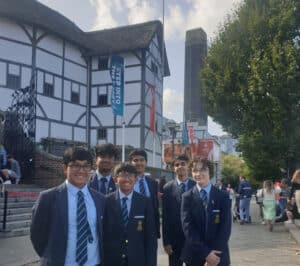 Other recent trips to the Globe have been to see two comedies: A Midsummer Night’s Dream and The Comedy of Errors, set respectively in the ancient cities of Athens, Greece, and Ephesus, in modern-day Türkiye (Turkey).
Other recent trips to the Globe have been to see two comedies: A Midsummer Night’s Dream and The Comedy of Errors, set respectively in the ancient cities of Athens, Greece, and Ephesus, in modern-day Türkiye (Turkey).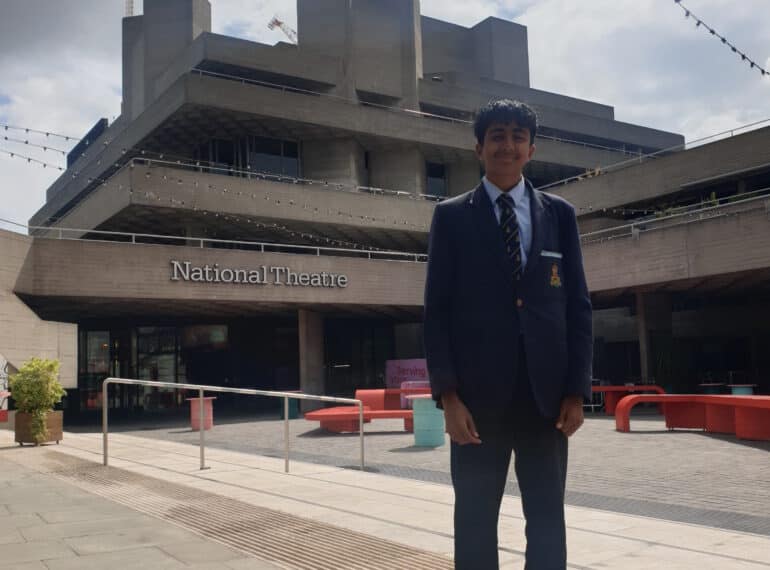
 Head of English Robert Hyland said: “Many congratulations to Adithya for a wonderful achievement. For someone as young as him to produce such a powerful piece of writing is truly astonishing – and for a student to have their work performed at the National Theatre is unprecedented in the School’s history.
Head of English Robert Hyland said: “Many congratulations to Adithya for a wonderful achievement. For someone as young as him to produce such a powerful piece of writing is truly astonishing – and for a student to have their work performed at the National Theatre is unprecedented in the School’s history.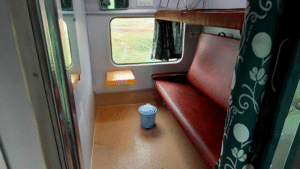 His play was a philosophical and reflective story about a British-Indian teenager taking a train ride across southern India after his mother’s death, and the relationship he developed both with his father and with the country of India.
His play was a philosophical and reflective story about a British-Indian teenager taking a train ride across southern India after his mother’s death, and the relationship he developed both with his father and with the country of India.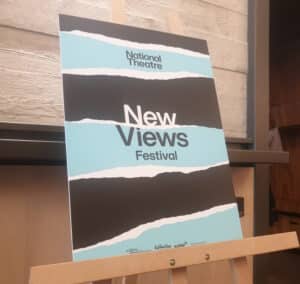 Adithya’s mentor, Andrew Muir, has had plays produced throughout the UK and in recent years his work has been performed at the National Theatre’s Connections festival, at Soho Theatre and on the BBC. His assessment of Adithya’s play described it as “a joyous road trip of a story, in which both father and son are brought back together again following the devastating loss of their wife and mother respectively.
Adithya’s mentor, Andrew Muir, has had plays produced throughout the UK and in recent years his work has been performed at the National Theatre’s Connections festival, at Soho Theatre and on the BBC. His assessment of Adithya’s play described it as “a joyous road trip of a story, in which both father and son are brought back together again following the devastating loss of their wife and mother respectively.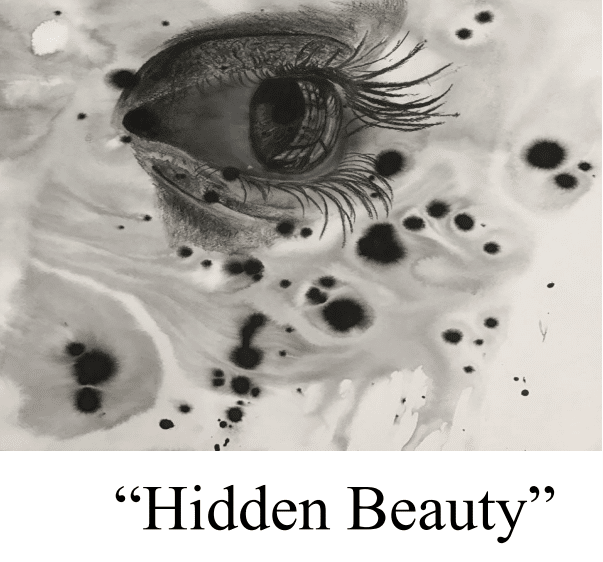
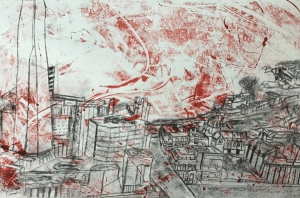
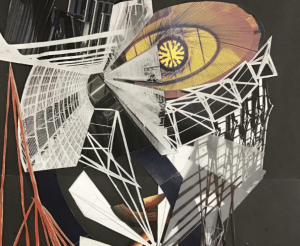 Six artists’ work is featured, including the front-cover illustration by Year 13’s Dylan Domb, pictured top, and pieces by Gabriel Gulliford (also Year 13), above right, and Year 12’s Pratham Bhavsar, left.
Six artists’ work is featured, including the front-cover illustration by Year 13’s Dylan Domb, pictured top, and pieces by Gabriel Gulliford (also Year 13), above right, and Year 12’s Pratham Bhavsar, left.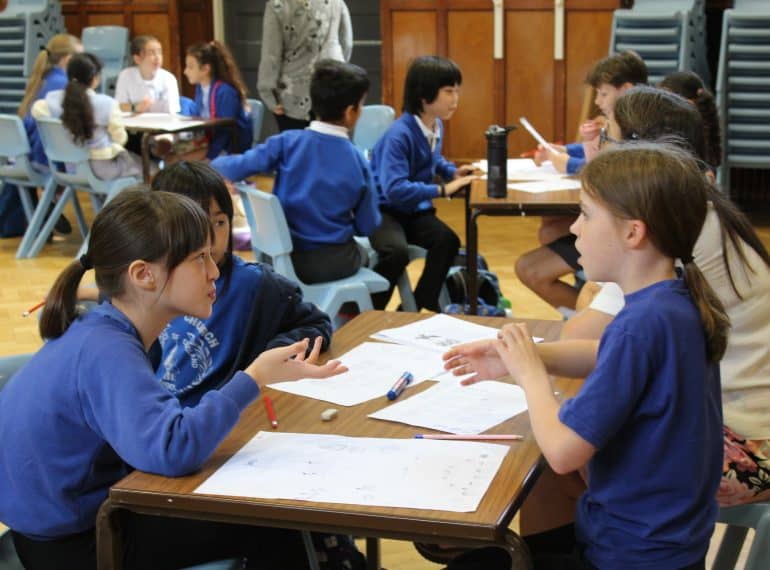
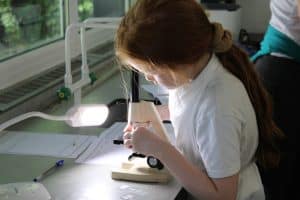 The events, which are part of QE’s partnerships work with the local community, are aimed at giving Year 5 girls and boys an early taste of secondary school education.
The events, which are part of QE’s partnerships work with the local community, are aimed at giving Year 5 girls and boys an early taste of secondary school education. The first of the three days was the ever-popular Primary Forensics Workshop. The visitors were tasked with completing a number of experiments and analyses to work out who had murdered the Headmaster!
The first of the three days was the ever-popular Primary Forensics Workshop. The visitors were tasked with completing a number of experiments and analyses to work out who had murdered the Headmaster!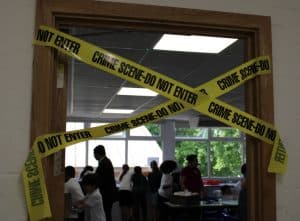 Boys from Year 12 helped staff run this workshop, engaging with the children at each station.
Boys from Year 12 helped staff run this workshop, engaging with the children at each station.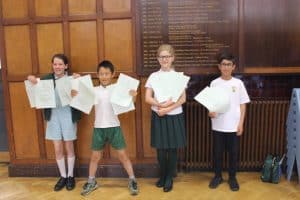 Firstly, teams were given the challenge of designing a castle on paper. They had to base their design on a certain set of criteria and follow a budget, requiring them to decide which features they wanted to prioritise.
Firstly, teams were given the challenge of designing a castle on paper. They had to base their design on a certain set of criteria and follow a budget, requiring them to decide which features they wanted to prioritise. There was then a Sustainability Challenge run jointly by Geography and Economics. The children had to work in groups and devise a sustainable product. They designed their product, chose a logo and decided on their target market. Then each group presented to the other children in attendance. Among the ideas generated were: a mobile phone where the case is a solar panel and charges the phone, and a ‘plastic’ bottle where the bottle itself is biodegradable.
There was then a Sustainability Challenge run jointly by Geography and Economics. The children had to work in groups and devise a sustainable product. They designed their product, chose a logo and decided on their target market. Then each group presented to the other children in attendance. Among the ideas generated were: a mobile phone where the case is a solar panel and charges the phone, and a ‘plastic’ bottle where the bottle itself is biodegradable.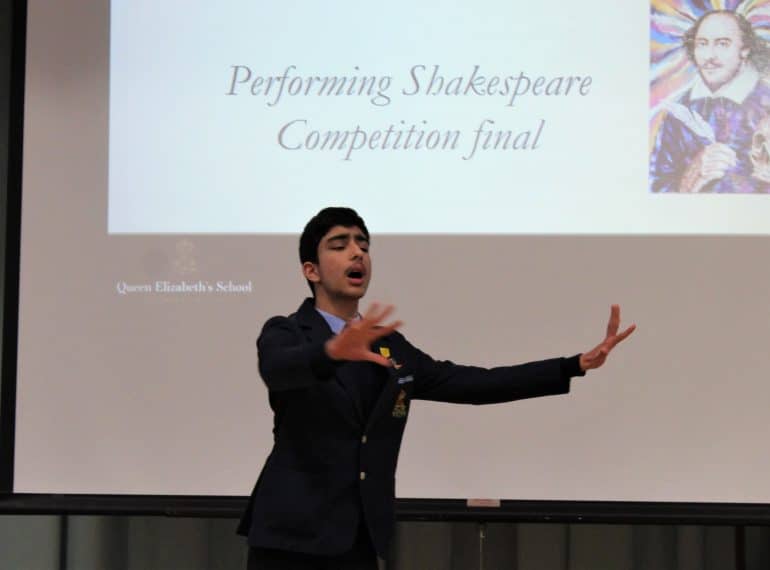
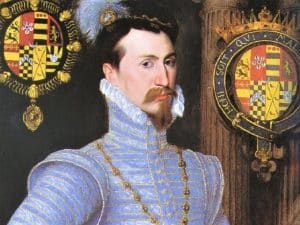 “It was Leicester, one of the great figures of the Elizabethan age, a leading patron of the theatre and, of course, a near-contemporary of Shakespeare, who, in 1573, asked Queen Elizabeth I for the Charter to establish Queen Elizabeth’s School,” said Mr Enright. “Thus, our Shakespeare Festival Week in a sense honours his legacy to the arts as we prepare to celebrate the 450th anniversary of our School next year. We are seeking to build on that legacy today through promoting drama and through the central importance we attach to oracy and verbal communication.”
“It was Leicester, one of the great figures of the Elizabethan age, a leading patron of the theatre and, of course, a near-contemporary of Shakespeare, who, in 1573, asked Queen Elizabeth I for the Charter to establish Queen Elizabeth’s School,” said Mr Enright. “Thus, our Shakespeare Festival Week in a sense honours his legacy to the arts as we prepare to celebrate the 450th anniversary of our School next year. We are seeking to build on that legacy today through promoting drama and through the central importance we attach to oracy and verbal communication.”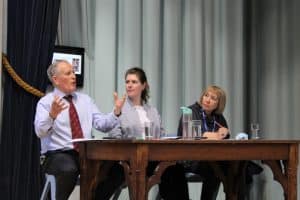 For the final, the English department drafted in their own panel of ‘guest’ judges – History and Politics teacher Liam Hargadon, Head of Geography Emily Parry and Mrs Elaine White, retired teacher of drama at QE. The event was hosted by Assistant Head (Pupil Involvement) Crispin Bonham-Carter.
For the final, the English department drafted in their own panel of ‘guest’ judges – History and Politics teacher Liam Hargadon, Head of Geography Emily Parry and Mrs Elaine White, retired teacher of drama at QE. The event was hosted by Assistant Head (Pupil Involvement) Crispin Bonham-Carter.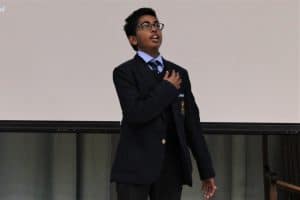 “The overall House winner was Stapylton; Snehal Das gave a powerful empathetic performance as Shylock from The Merchant of Venice, and Nimesh Nirojan seemed like he was speaking to thousands in the Roman forum as he gave Antony’s funeral oration from Julius Caesar.”
“The overall House winner was Stapylton; Snehal Das gave a powerful empathetic performance as Shylock from The Merchant of Venice, and Nimesh Nirojan seemed like he was speaking to thousands in the Roman forum as he gave Antony’s funeral oration from Julius Caesar.”